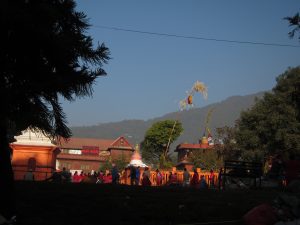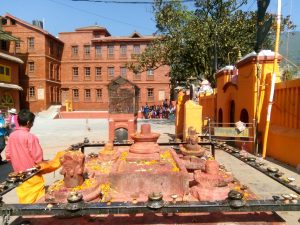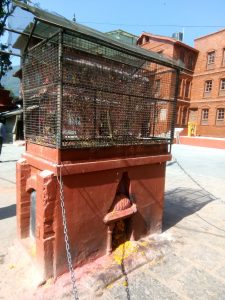Tokha Stone Inscription
Inscription carved on a slab of stone found in the village of Thokā, near Dharamsthali, Kathmandu. The stone is much eroded and the first six lines of the inscription is illegible. Saṃvat 519.
Satungal Stele of Sivadeva and Amsuvarman
Satungal Stone Inscription of Sivadeva and Amsuvarman
Inscription carved on a slab of stone found in the village of Śatungal, near Balambū, Thānkot. Saṃvat 519.
Budhanilakantha Stele



Inscription engraved on a slab of stone found in Būḍhānīlakaṇṭha, near the gate of the walled tank of the Śeṣanārāyaṇa statue, Kathmandu. The date is read as saṃvat 518 by Gnoli and 517 by Vajrācārya and Regmi.
Barcelona Copper Plate Charter
Working edition by Francesco Bianchini (01/2021).
FACE 1
vasantatilakā
1) siddham (symbol) _
(śaśv)at sa va[+ḥ] śiśuśaśāṅkamarīcimālā- /
māṇi(kya)(X X X) (2) (tani) X X ǂǂ (m)uṇḍamālā[sic!] //
ya[+ḥ] sambhavasthitivināśanim(i)ttahe(3)tu[+ḥ] /
(su/sra) (gyā) Xlāni kali(kā)la(bha)vāni śarvva(ḥ / | ?) // svasti jaya
4) purā ⃝ paramamāheśvaro mātāpitṛpādā(nu)dhyāto
5) (na)la ⃝ vaṅśasamudbhavaḥ śrīmān vi(rū?)parājadevaḥ
6) kuśalī (Antarnāla?)kaviṣayāntaḥpāti (saba?)X
7) (va.ri?)padrakagrāme brahmaṇā(ṅ p)ūjya itarajanapa-
FACE 2
8) d(ā)[+n] sa(mā)diśati viditam ast(u) bhavatā[+ṃ] yathāsmābhi
9) r aya([+ṃ]) (grā)mo ācāryavinītarāśer abhya[+r]thita na (bha)
10) (gavataḥ) s tṛbhuvanaguro vinīt[!a!]{=e=}śvarabhaṭṭarakāya kha
11) (ṇḍasphu) ⃝ titasa[+ṃ]skārā(va)licarusatrapravarttanāya mā
12) tāpitror ātmanaś ca pun[sic!]yābhivṛddhaye dattaraXXX
13)Xgamy(e) samucita(bha)ga(bhāga)karahiraṇyapratyā[+yā] (ny a-)
14) smai panayadbhi[+ḥ] sukha[+ṃ] prativa_sty(?)avyam iti
FACE 3
anuṣṭubh
15) va(hu)bh(ir) vasudhā dattā rājabhiḥ sagar(ā)dhibhi(ḥ)
16) yasya yasya yadā bhūmis tasya tasya tadā phala[+ṃ]
anuṣṭubh
17) __ ⃝ yathā gaur bharat[!a!][=e=] vatsaṃ
kṣīra{ancient correction?}m u(cchri)jya Xri (18) (gau)
(e)vaṃ dattvā sahasrā(n ca?)
(bhū)mir bhārati bhūmi(19)da(ṃ) (//)
anuṣṭubh
ṣaṣṭivarṣasahasrāṇi svargge modati bhū(mi)- 20)daḥ [+|]
ācchettā cānumantā ca tāny eva narake vase[+t] /@
FACE 4
anuṣṭubh
21) sva(da)ttāṃ __ paradattām vā yo hareta vasundha-
22) rāṃ sa viṣṭhāyāṃ kṛ(mir) bhūtvā pitṛbhi saha pacyate
metre? āryā
23) iX⃝ kamalada(lāmbub)indulolā śrīyam anu-
24) ci ⃝ ntya manuṣyajīvi X (ca) sakalam idam udāhṛtaṃ
25) (śe)XX na hi puruṣena parakīrttayo [+‘]vilopyā (/)
samva(T)
26) Aśvina (di) 1 pratham(y) AXXcā(smi)XXXXX
Barcelona Copper Plate Charter
Budhanilakantha Stone Inscription
Inscription engraved on a slab of stone found in Būḍhānīlakaṇṭha, near the gate of the walled tank of the Śeṣanārāyaṇa statue, Kathmandu. The date is read as saṃvat 518 by Gnoli and 517 by Vajrācārya and Regmi.
Dharamsthali Slab of Stone
Slab of stone found in Dharamsthali, Kathmandu. Gnoli reads the date as 518 but Vajrācārya and Regmi read it as 517.
Dharamsthali Inscription
Inscription on a slab of stone found in Dharamsthali, Kathmandu. Gnoli reads the date as 518 but Vajrācārya and Regmi read it as 517.
Tulacchentole Slab of Stone
Slab of stone found in the village of Tulācchenṭole in Bhaktapur. Gnoli reads the date as saṃvat 517 and Vajrācārya and Regmi read it as saṃvat 516.
